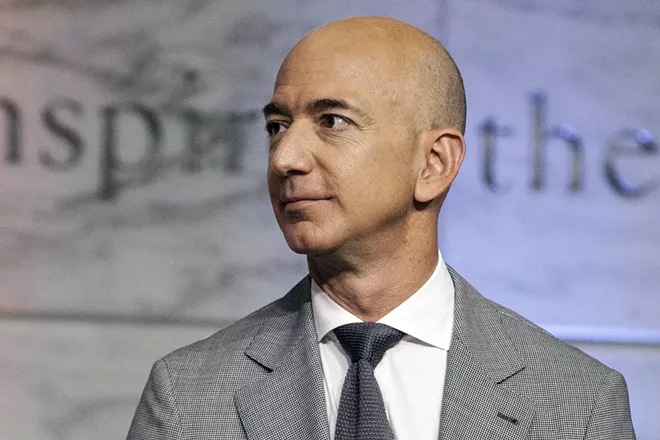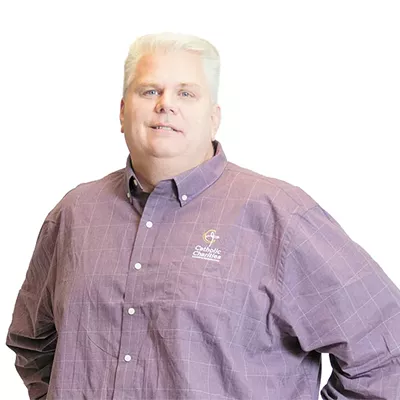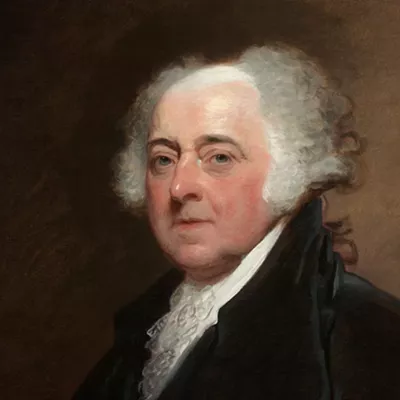As ordinary Americans continue to struggle with the economic effects of the global pandemic, Amazon executive chairman and founder Jeff Bezos boarded a phallic rocket ship bound for the stars. Or very nearly. Bezos was among a handful of the super wealthy on the inaugural flight of Blue Origin, a company founded to promote space tourism by breaching the Karman Line, which separates earth's atmosphere from outer space about 62 miles above our heads. The price tag for the flight that lasts a little over 10 minutes was in the ballpark of $30 million. And I bet the passengers didn't even get a little bag of pretzels.
For some people, Blue Origin and its competitors, including Richard Branson's Virgin Galactic, represent the triumph of the human spirit. In much the same way as people across the globe celebrated the Space Race during the Cold War, Bezos is a "pioneer," pushing the boundaries of science and space exploration. To other people, the Amazon boss represents all that is wrong with the billionaire class: Bezos is little more than a megalomaniacal parasite, whose ticket was paid for through the labor of his exploited warehouse workers.
Americans are both enraptured and repulsed by wealthy magnates. While the Founders were suspicious that concentrated wealth threatened the survival of the republic, later generations of Americans celebrated the so-called "Gospel of Wealth." By the second half of the 19th century, business moguls became celebrities. Figures like Andrew Carnegie seemed to personify the rags-to-riches story of hardworking, self-sufficient immigrants who made good in America, the land of opportunity. Carnegie might have been super rich, so the story goes, but he still put on his pants one leg at a time.
Bezos' own life story doesn't fit the mold of a heartwarming Horatio Alger penny dreadful. A Princeton graduate, Bezos made his living on Wall Street in the 1990s before founding Amazon in 1994. Starting as an online book retailer, Amazon soon assumed the epic proportions of a global behemoth. As a member of the tax-dodging, job-outsourcing, global elite, Bezos has managed to attract the ire of Trump AND Bernie supporters, which is no mean feat in our hyperpartisan political climate.
But the truth is that the humble origin stories that we choose to celebrate conceal more than they reveal about America's hypercapitalists. Though not as well known today as Andrew Carnegie, America's first multimillionaire businessman, John Jacob Astor, shared a similar immigrant story to Carnegie, but he also constructed a transnational trading empire not unlike Amazon during the late-18th and early-19th centuries.
Astor was born in present-day Germany in 1763 before emigrating to New York City shortly after the end of the Revolutionary War. Astor made his money in the fur trade, initially as an associate of the British North West Company headquartered in Montreal. From the beginning, then, Astor depended on international connections to make his millions. In the early 1800s, Astor saw an opportunity to wrestle control of the fur trade away from his British patrons. He solicited the support of the Jefferson administration for his "American Fur Company," which would establish a vast trading empire extending from New York to the Pacific Northwest. American in name, perhaps, but not in nature. Astor's scheme depended on employing Canadian traders in the Columbia River valley to establish new trade connections with Chinese merchants in Canton (modern-day Guanghzou). Deftly shifting his investments into New York real estate during the 1830s, Astor was fabulously wealthy by the time he died in 1848.
Astor's power did not die with him. He founded a family dynasty that formed part of a new global business elite. The Astors dominated finance and politics by intermarrying with the New York establishment, including the Roosevelts. The Astors set their sights even farther afield, establishing themselves as English aristocrats. King George V made John Jacob's great-grandson, William Waldorf Astor, a lord in 1916. His descendants still hold the title of Viscount Astor today. By the time John Jacob Astor IV famously drowned on the Titanic in 1912, his family had amassed almost unrivaled wealth and power on both sides of the Atlantic.
It's hardly surprising that anyone should criticize Bezos' space tourism for the super wealthy, particularly during our current moment of economic uncertainty. But Bezos is no more out of touch with the lives of ordinary Americans than any other business tycoon in our history. We would like to imagine that our business heroes are like us or, perhaps, that we could be like them if we only work hard enough. This is a fiction designed to justify the existence of the super wealthy. Whether Bezos in the 21st Century or Astor in the 19th Century, hypercapitalists make their money through ruthless expansion that knows no bounds if left unchecked. I have no doubt that John Jacob Astor would have joined Bezos in the grotesque spectacle of consumption that is Blue Origin if only he had had the chance. And Carnegie would have brought the pretzels. ♦
Lawrence B. A. Hatter is an award-winning author and associate professor of early American history at Washington State University. These views are his own and do not reflect those of WSU.
























